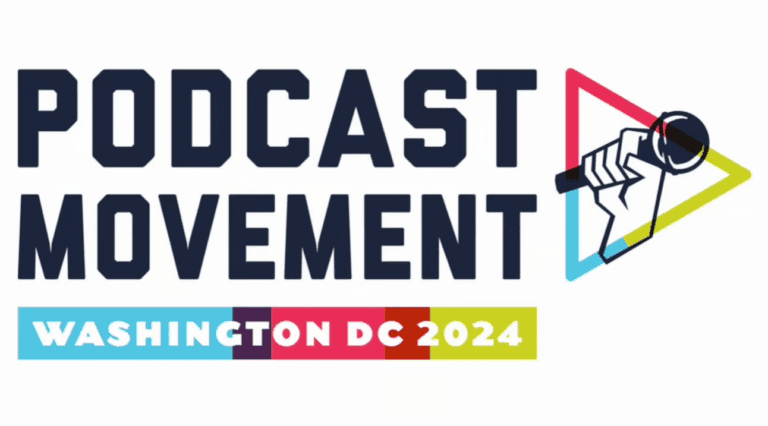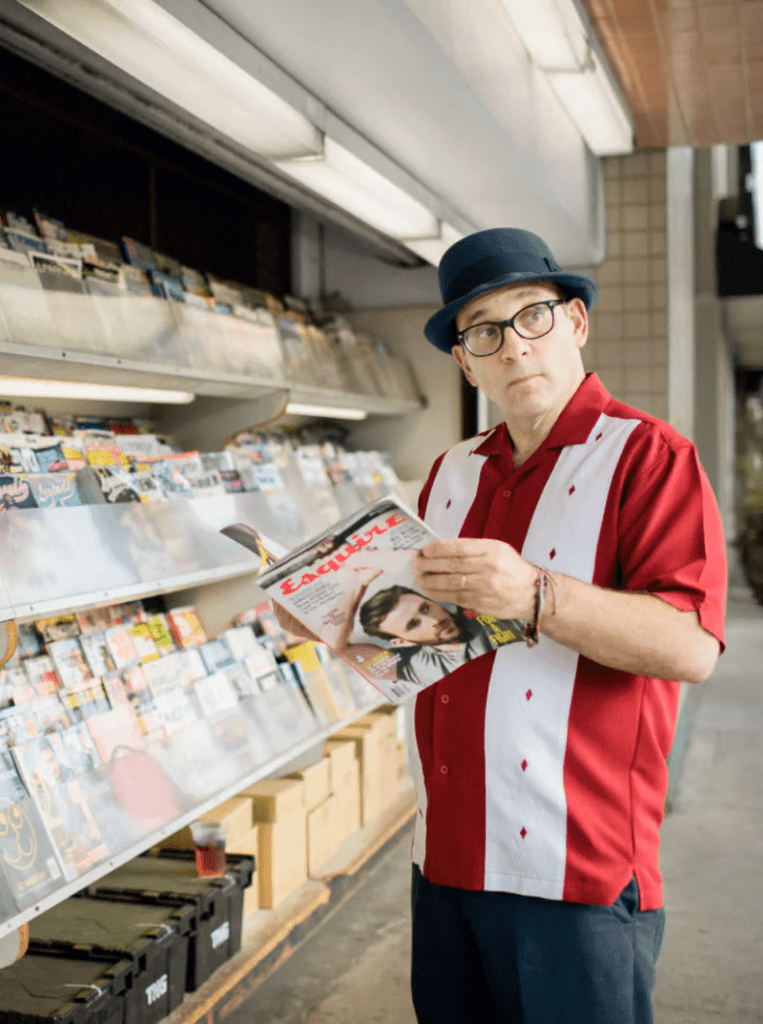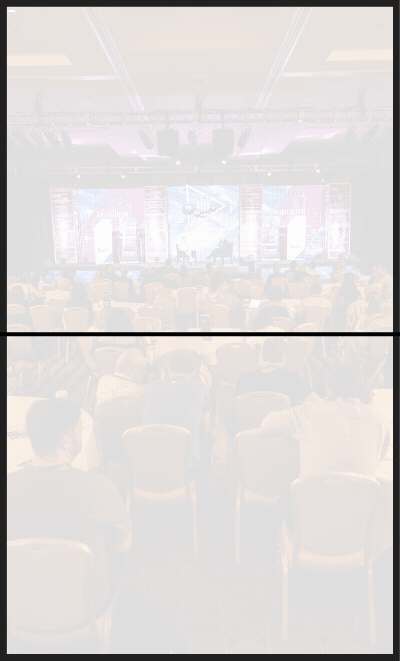
Presented by Podcast Movement
Creation is iteration. Your job as a creator is to take as many of the wrong turns as necessary, without giving up hope, until you find the path that leads to your destination.
Adam Savage
💡 A Technique for Producing Ideas
When asked, “How do you get ideas?” renowned ad man James Webb Young was stumped. After thinking more deeply about the question, he realized his technique could be boiled down to five simple steps.
“It has been used in many fields,” says Young. “Advertising copywriters, engineers, poets, painters, and scientists have all benefited from this technique to make creative breakthroughs.”
And now, we can add podcasters to that list.
Gather Material – Index and organize specific and general information, which will act as your clay
Think – Mix and mold the clay, writing down every idea, seeking to make new combinations—go wild, go deep, go anywhere
Take a Break – Put the problem out of your mind and let your subconscious chew on it while you do something that stimulates your emotions—listen to music, go for a walk, read a book
The Idea Arrives – Write it down, but don’t quit yet—most of us stop too soon in the process after getting the initial idea
Development – Refine and rework the idea, seeking out criticism from trusted sources
A note from Webb on the Development stage: “And here is where many good ideas are lost. The idea person, like the inventor, is often not patient enough to go through with applying this adapting path of the process. But it has to be done if you are to put ideas to work in a work-a-day world. Do not make the mistake of holding your idea close to your chest at this stage. Submit it to the criticism of the judicious.”

🎉 Make your plans early to join us August 19th – 22nd in Washington, DC!
👉 Use the code GATE to save $50 for a limited time.
Industry game changers and valiant minds from creative professions share their wisdom, adversities, and paths to innovation.
🎙️ Signal Flow: Cal Fussman
This week, we dip into The Noise Gate archives to revisit some of the best creative secrets and advice, straight from the pros themselves.

Cal Fussman is a New York Times bestselling author, world-renowned interviewer, keynote speaker, corporate consultant on interviewing and storytelling, writer at large for Esquire, and host of Big Questions with Cal Fussman. Cal has interviewed hundreds of world icons, including Muhammad Ali, Mikhail Gorbachev, Jodie Foster, Arnold Schwarzenegger, Jimmy Carter, Nelson Mandela, Jennifer Aniston, and many more.
(Trigger warning: The following interview briefly mentions suicide.)
No matter how boring somebody seems, crazy shit happened in their life at one point. And they have a story to tell about it. We should never think there are people who are beneath listening to.
Podcasting connects me to people. When you do public speaking, people come up and want to say hello. There's a multitude of people that want to have a connection with you and you want to connect with them. That’s the beauty of my podcast. Because week after week, they can tune in and feel like they're connected. And I feel like I'm connected to them.
I wish I had started podcasting earlier. Tim Ferriss was a great force in pushing me forward. He kept on telling me, “Please start a podcast, please start a podcast.” I was operating on those Esquire interviews with a little tape recorder, so it took me a while to get from micro cassettes over to digital tools. That was a huge jump in technology for me. But Tim took out his gear, did a podcast with me, and showed me everything I needed to know. There's no skin in the game for him, he was just looking for a way to help me.
When you have a good friend, they always seem like an old friend. That's a beautiful thing.
One of my listeners in Saudi Arabia was feeling separated from her family and was in a very bad mental state. She started to think about committing suicide and planned when she was going to do it. When the time came, somehow, it overlapped with the time my podcast came on. So she’s listening to the epsiode and I was telling a story, and she couldn't leave to commit suicide because she had to hear the end of the story.
I don't know what was going through her mind, but she wrote to me to say thank you for the episode. She got through the moment, and my podcast was with her when she needed it most. It inspires you to keep doing what you're doing.
During the pandemic, I moved across the country to take care of my dad, he was turning 90. Before he passed away, he had gotten COVID. We were on a conference call and the doctor told him, “Sir, from what you're describing, you're either going to be dead in four days or…” My dad said, “I ain't gonna be dead.” I thought, I better find a way to make sure this moment in time always exists. And so we talked about it on my podcast.
It's not like I'm getting over his death, but I’m just seeing blue skies now for the first time. I’ll always be happy I did that interview because it’s a way for us to continue speaking to each other.
I think one of the best things I've ever written was in the words of a guy who was near the top of the World Trade Center when the hijacked planes hit. His name's Michael Wright. He described what it was like to go from the 81st floor, get down to the lobby, and out into the street. In the reflection of the windows of the Millennium Hotel, he saw one of the World Trade Center towers basically falling on his head. And he rushed inside just as it all collapsed on him. Miraculously, he survived. And he lived to tell the story. And I always felt like 1,000 years from now, somebody could read that and know what it was like to live through that experience.
I'm looking up at my wall. I have copies of books I've blown up with signatures I’ve gotten from Dalai Lama, Gabriel García Márquez signing Loving in the Time of Cholera. Mikhail Gorbachev signing his memoirs, Larry King signing the book that I helped him write. I'm looking at these things and thinking, shouldn’t I be showing up in different places on the planet and finding out what the hell is going on? And I'm only now thinking about taking my podcast around the world.
I’ve got another 25, 30 years to live. It’s a good time to get out there and do it. It just makes sense when I think carefully about what I want to do with the time I have left.
When I wrote the Things I’ve Learned column for Esquire, the order of the pieces of wisdom was important. How you start, what holds up the middle, how you end. I remember interviewing Robert Duvall, the actor. He had this horse. And when a photographer was around, the horse always stuck his head in to get in the picture. Our photographers went out and sure enough, the horse is putting his head in to get into the picture. That wound up being the last line in the interview. It just left you with a smile.
🥾 Further Exploration
Here’s one of many gems from the Transom library: Lean in and Listen Like It’s Music. Frustrated with the predictability and clichés of narrative podcasts in the States, Rob Rosenthal turned to pieces produced in Europe, where there’s “a ‘radio art’ tradition, that is much less formulaic and didactic,” says Rosenthal. “They’re more literary and more sonically creative than in the States. Put another way, I’m rarely able to predict what will happen next — a good thing.”
ICYMI:
Enjoying The Noise Gate? Why not share it with a fellow podcaster?
Until next time, have a bold week.
– Doug
For advertising information, contact Kristy at kristy@podcastmovement.com




Join the Movement